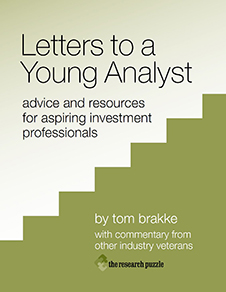
- Thursday, March 25th, 2010
- narrative power
-
What stories have you heard today?
The investment world illustrates the power of narrative. Up and down the informational food chain, stories are used to enlighten and, sad to say, to deceive. The “tellers” are the sellers of ideas, themes, and securities that find their way into our portfolios.
For stock investors, many of the stories originate with companies and their officers, who learn that crafting a narrative that puts everything in the best light is part of their leadership role. Sometimes, those messages are reinforced and amplified by sellside analysts whose telling of the story becomes part of their own brand. (As a reminder, I keep a now-tarnished silver plate Tiffany business card holder on my desk, on which is inscribed: “CUC International Inc. | Bear Stearns | $40 in ’97.” Someday I’ll retell the whole tale.)
Some equities even become known as “story stocks” because belief in them requires the ability to see beyond conventional wisdom. They may work out or they may not, but it pays to know where in the story you are before playing. An investment manager recently told me that he limits such stocks to a predefined part of his clients’ portfolios and needs to analyze those stocks differently than others. That’s good advice.
Once an idea works well, it often becomes a theme in market storytelling. Take the case of General Growth Properties, recently back from the dead. I have watched the unfolding of that story with interest (although not of the financial variety). There were lots of twists and turns, but here’s the bottom line that I saw: Some savvy market players did intensive analysis and due diligence to find mispriced assets, and their timing was good because the stock and credit markets healed to the point that some part of the value could be realized. We’ll know in the fullness of time whether that story is the one that is passed down through the generations, but I see another take on it all too frequently: “We can buy these five-letter symbols and make a killing, dude.” That’s the wrong story and the wrong lesson.
We keep stories in our heads for a long time and try to apply them over and over. Market pundits have a particular fondness for comparing the current environment to specific market years of the past. I did that on Wednesday; the big jump in yields reminded me of when bonds started getting slammed in late March of 1987, a fateful year in itself. Those memories probably explain why I am so sensitive to asset class dislocations.
One story that continues to captivate is the financial crisis. Michael Lewis tells the tale that most will hear, given that “no one writes with more narrative panache about money and finance than Mr. Lewis,” according to the New York Times. Others howl in protest at that, including Janet Tavakoli, who penned a piece on Lewis that featured a title that called him a “junior salesgirlieman,”Huffington Post | She takes some good shots here, although storytelling is not Tavakoli’s strong suit. She could often use a better editor. and Yves Smith, who ripped apart Lewis’ “hagiography” of individuals that she thinks don’t deserve it.naked capitalism | This is a long “debunking” post with lots of comments, and interesting throughout. All three want to tell the story as they see it, and all three have philosophies to proclaim and books to sell. I can find things I agree with and things I disagree with in each.
As a buyer of ideas, I need to sort out the stories that make sense and that are applicable to what I am trying to accomplish. How I do so was summed up by others during a couple of interactions last week. The first occurred during a business lunch, at which I was described by someone in just four words: “Tom loves to learn.” The second was included in a comment from a first-time reader who was attempting to assess my approach. After reading several posts, he figured that I had a “skeptical nature.” There you have it.
My advice: Read widely and well, and realize that understanding comes from taking nothing for granted and questioning everything. And never fall in love with the story or the storyteller.
Cracking the narrative apart puts the power in your hands, not theirs.
